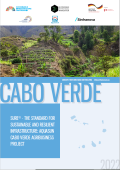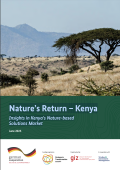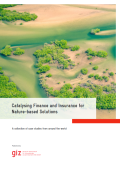This case study, Entry Points for Mainstreaming Ecosystem-based Adaptation - The Case of South Africa, is conducted by GIZ in South Africa to understand the entry points of Ecosystem-based Adaptation, and who were the pivotal parties, and how EbA can be further expanded in each country in the future. This report is a comprehensive review of existing policy and strategy was made, which was followed by a set of interviews with parties located in government as well as private sector organisations who have often led on-the-ground activities to date.
Ecosystem-based adaptation is viewed as one of the principle ways in which countries can respond to climate change. The concept is scientifically sound and implementation often produces a broad set of ecological, social and economic cobenefits. Yet uptake of the concept varies considerably around the globe. In certain countries, for example, South Africa, the concept has gained significant traction while in other regions there is little uptake of idea.
The successful realisation of EbA can be broadly considered as the implementation of required policies and measures at scale, in a manner that is comprehensive and rational, taking into account social, economic and ecological trade-offs. In terms of time scale, the full realisation of EbA not only includes immediate opportunities, but the continual consideration of ecosystem approaches over time. In terms of spatial scale, EbA generally only makes sense in terms of effectiveness and efficiency, for example, at the scale of a catchment or landscape.
While recognising recently published EbA strategies and guidelines, the assessment identified potential entry points at four levels of governance:
- Setting the national agenda through policy and strategy;
- Spatial planning at a catchment scale;
- Implementation of on-the-ground activities;
- Sustaining implementation through required supporting functions.




